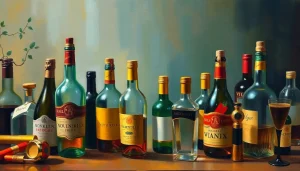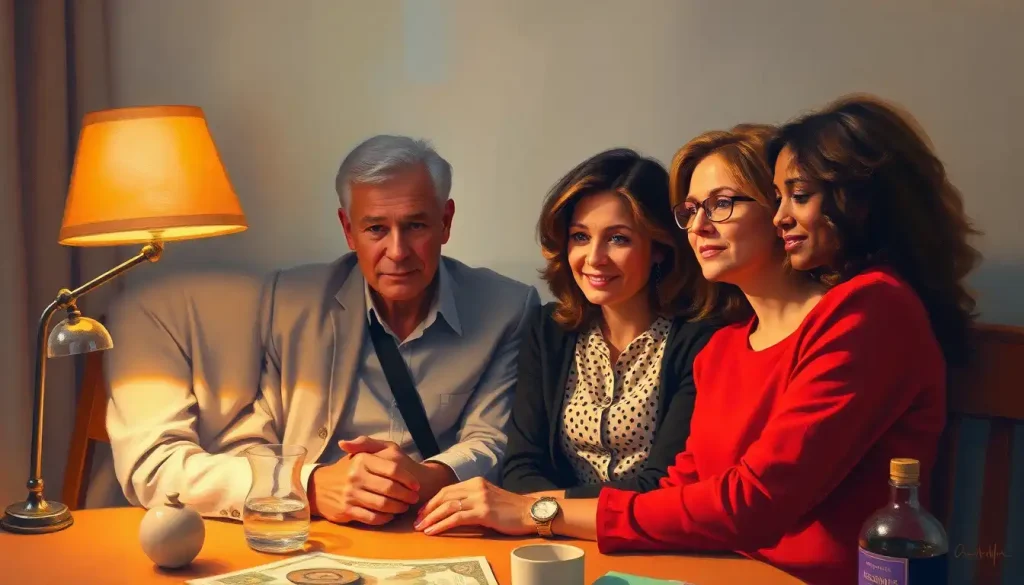Beyond stocks and real estate lies a fascinating world where savvy collectors are turning bottles of rare spirits into liquid gold, with some vintages yielding returns that would make Wall Street veterans raise their glasses in envy. The realm of alcohol bottle investing has been quietly bubbling up in recent years, attracting connoisseurs and investors alike with its unique blend of passion and profit potential. It’s a market where rarity, age, and provenance can transform a simple bottle into a prized asset, capable of appreciating in value far beyond its original price tag.
As traditional investment avenues become increasingly saturated, many are turning their attention to alternative assets. Among these, alcohol bottles have emerged as an intriguing option. From rare whiskeys to vintage wines, the world of spirits offers a diverse range of investment opportunities. But what makes a bottle of alcohol a worthy investment? And how can one navigate this complex and sometimes volatile market?
The Spirited Rise of Alcohol Investments
The popularity of investing in alcohol bottles has seen a remarkable uptick in recent years. This surge isn’t just a flash in the pan; it’s backed by solid market trends and an increasing recognition of fine spirits as legitimate alternative investments. According to a report by Knight Frank, rare whisky has outperformed other luxury investments, including art, cars, and watches, with a 586% growth over the past decade.
This growth is driven by several factors. First, there’s the undeniable allure of owning a piece of liquid history. Many collectors are drawn to the stories behind rare bottles, whether it’s a whisky distilled during World War II or a wine from a legendary vintage. Second, the rise of the global middle class, particularly in emerging markets like China and India, has created a new wave of collectors and investors eager to acquire premium spirits.
Moreover, the finite nature of certain vintages adds to their appeal. Once a particular year’s production is consumed, it can never be replicated, driving up the value of remaining bottles. This scarcity factor, combined with the tangible nature of the investment, makes alcohol bottles an attractive alternative to more traditional financial instruments.
Uncorking the Potential: Types of Investable Spirits
When it comes to investing in alcohol bottles, not all spirits are created equal. Certain categories have proven to be particularly lucrative for investors. Whiskey investing, for instance, has seen tremendous growth, with rare Scotch and Japanese whiskies leading the charge. A bottle of Macallan Fine and Rare 60-Year-Old 1926 sold for a staggering $1.9 million in 2019, setting a new world record for the most expensive bottle of whisky ever sold at auction.
But whiskey isn’t the only spirit worth considering. Wine investing has long been a staple for collectors, with certain vintages from prestigious Bordeaux and Burgundy estates fetching astronomical prices. A case of 1945 Romanée-Conti sold for $558,000 in 2018, showcasing the enduring appeal of fine wines.
Craft spirits and small-batch productions are also gaining traction among investors. Limited releases from artisanal distilleries can appreciate rapidly, especially if the distillery gains acclaim or ceases production. For example, bottles from the now-closed Karuizawa distillery in Japan have become highly sought after, with prices skyrocketing since its closure in 2000.
Collectible liqueurs and specialty bottles represent another interesting niche. Rare editions of popular brands or bottles with unique designs can command premium prices. The Louis XIII Black Pearl Anniversary Edition, a cognac presented in a specially designed Baccarat crystal decanter, sold for $16,000 upon its release in 2014 and has since appreciated significantly.
Crafting Your Liquid Portfolio: Strategies for Success
Successful investing in alcohol bottles requires more than just a taste for fine spirits. It demands careful research, authentication skills, and a strategic approach to building and managing your collection. Here are some key strategies to consider:
1. Do Your Homework: Research is crucial in this market. Familiarize yourself with different brands, distilleries, and vintages. Understanding the history and production methods of various spirits can help you identify potential investment opportunities. Resources like auction house reports, specialist publications, and online forums can provide valuable insights.
2. Authenticate and Verify: In a market where a single bottle can be worth thousands or even millions, authenticity is paramount. Learn to spot fakes and always verify the provenance of your purchases. This might involve examining bottle designs, label details, and even the liquid itself. When in doubt, consult experts or use professional authentication services.
3. Store with Care: Proper storage is critical to maintaining and enhancing the value of your collection. Most spirits should be stored upright, away from direct sunlight, and at a consistent temperature. Wine investing in the UK often involves professional storage facilities to ensure optimal conditions.
4. Diversify Your Holdings: As with any investment portfolio, diversification is key. Consider spreading your investments across different types of spirits, regions, and price points. This can help mitigate risk and potentially capture gains across various market segments.
Gauging the Value: Assessing Your Liquid Assets
Evaluating the potential returns of alcohol bottle investments requires a keen eye and access to reliable market data. Several factors can influence a bottle’s value appreciation:
– Rarity: Limited editions, single cask releases, and bottles from closed distilleries often command premium prices.
– Age: Generally, older spirits are more valuable, but this isn’t always the case.
– Brand Reputation: Established brands with a history of producing high-quality spirits tend to hold their value well.
– Condition: The state of the bottle, label, and packaging can significantly impact value.
To stay informed about current market trends and prices, investors can use online resources and price guides. Websites like Whisky Stats and Wine-Searcher provide valuable data on historical prices and market trends. Auction results from major houses like Sotheby’s and Bonhams can also offer insights into the high-end market.
Consulting experts and appraisers can provide more personalized assessments of your collection. Many auction houses offer valuation services, and there are independent specialists who can provide expert opinions on rare and valuable bottles.
Navigating the Risks: Challenges in Alcohol Investing
While the potential returns can be intoxicating, investing in alcohol bottles comes with its own set of risks and challenges. Market volatility is a significant concern, as trends in the spirits world can change rapidly. A once-popular brand or style might fall out of favor, impacting the value of your investment.
Counterfeits and fraud pose another serious risk. The high values attached to rare bottles have unfortunately attracted counterfeiters. In 2018, it was revealed that a single collector had unwittingly purchased $2.7 million worth of fake whisky, highlighting the importance of due diligence and authentication.
Legal considerations and regulations can also complicate matters. Different countries have varying laws regarding the sale and transportation of alcohol, which can affect your ability to buy, sell, or move your collection.
Liquidity can be another challenge. Unlike stocks or bonds, you can’t simply sell your bottle investments at the click of a button. Finding buyers for rare and expensive bottles often requires patience and potentially the services of a specialist broker or auction house.
A Toast to the Future: The Outlook for Alcohol Investments
As we look to the future, the market for rare and collectible spirits shows no signs of losing its fizz. The growing interest in premium and craft spirits, coupled with increasing wealth in emerging markets, suggests that demand for rare bottles will likely continue to grow.
However, like any investment, past performance doesn’t guarantee future results. The alcohol investment market may face challenges from changing consumer preferences, economic fluctuations, or regulatory changes. Bourbon investing, for instance, has seen tremendous growth in recent years, but some experts warn of a potential bubble.
For those considering dipping their toes into this liquid market, it’s crucial to approach it with the same rigor and caution you would apply to any other investment. Start by educating yourself about the spirits you’re interested in. Attend tastings, visit distilleries, and connect with other collectors to build your knowledge and network.
Consider starting small and gradually building your collection as you gain experience. Whisky investing for beginners doesn’t have to mean immediately splashing out on ultra-rare bottles. There are opportunities at various price points, and sometimes the bottles with the most potential are not the most expensive ones.
Remember that passion should be a key ingredient in your investment strategy. While the potential for financial gain is certainly alluring, the most successful collectors are often those who genuinely love and appreciate the spirits they’re investing in. After all, if your investments don’t appreciate as hoped, you’ll at least have some excellent bottles to enjoy.
Whether you’re a seasoned investor looking to diversify your portfolio or a spirits enthusiast intrigued by the idea of turning your passion into profit, the world of alcohol bottle investing offers a unique and potentially rewarding opportunity. Just remember to invest responsibly, do your research, and always enjoy in moderation. Cheers to your investment journey!
References:
1. Knight Frank. (2021). The Wealth Report 2021. Knight Frank Research.
2. Sotheby’s. (2019). “Macallan Fine & Rare 60-Year-Old 1926 Sets New World Auction Record.” Sotheby’s Press Release.
3. Wine Spectator. (2018). “Romanée-Conti Breaks Wine Auction Record.” Wine Spectator Online.
4. Scotch Whisky Association. (2020). “Scotch Whisky Economic Impact Report 2020.” SWA Research.
5. Forbes. (2018). “The Fake Whisky Epidemic.” Forbes Magazine Online.
6. Distilled Spirits Council. (2021). “Annual Economic Briefing.” DISCUS Research.
7. Liv-ex. (2021). “Fine Wine Market Report.” Liv-ex Market Analysis.
8. IWSR Drinks Market Analysis. (2021). “Global Trends Report.” IWSR Research.
9. Rare Whisky 101. (2021). “Rare Whisky Market Report.” RW101 Analysis.
10. Wine Investment Association. (2020). “State of the Wine Investment Market.” WIA Report.












Would you like to add any comments? (optional)